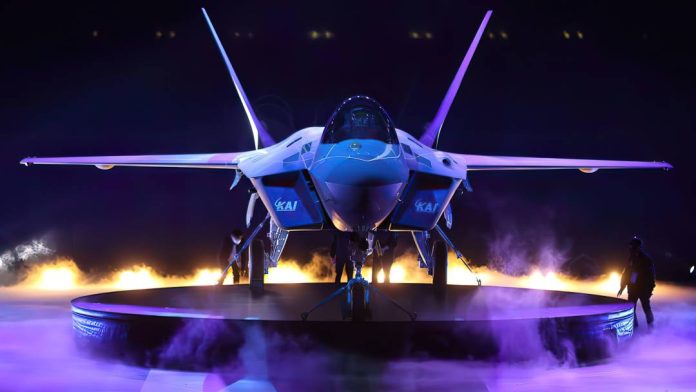
South Korea’s indigenous next-generation combat aircraft development, the KF-21 Boramae, has made good progress during its ground testing phase and has achieved around 50 percent completion of the overall test programme and approximately 95 percent of ground testing requirements necessary to perform its maiden flight, the official newspaper of the Ministry of National Defense (MND) Kookbang Ilbo reported on 13 June.
According to the paper, the first KF-21 prototype is expected to embark on its maiden flight in July should the remaining ground testing parameters and taxi tests be successfully completed.
Korea Aerospace Industries (KAI), the prime contractor for the KF-21 programme, is currently conducting ground testing with six prototypes and two spares, with each platform currently used to perform various critical and functional tests before actual flight testing. The company expects to perform around 2,000 developmental flights with the prototype aircraft.
The KF-21 is a multirole platform that will replace the Republic of Korea Air Force’s (RoKAF’s) ageing F-4D/E Phantom II and F-5E/F Tiger II aircraft. The RoKAF is expected to acquire 40 KF-21s by 2028 and another 80 aircraft by 2032.
KAI earlier stated that initial production aircraft will be optimised for air-to-air combat and will have limited air-to-ground capabilities. It will feature three hardpoints under each wing for weapons and/or external fuel stores, while missiles can also be externally carried under the fuselage. Serial production aircraft, however, will be fully capable of performing both mission sets. Low rate initial production is expected to commence from 2026, with full-rate production following from 2028.
The company revealed in an April 2021 stock exchange filing that it is planning to develop a new ‘smart factory’ to support aircraft production. The company said it will invest around US$87 million over five years to set up a ‘smart manufacturing system’ that will leverage on 4th Industrial Revolution (4IR) technologies such as artificial intelligence (AI) and big data analytics.
While the new facility will be utilised across several projects, one of its initial tasks is expected to be the production of KF-21 components and structures. It is understood that KAI aims to localise production of at least 65 percent of KF-21 components, involving the participation of over 700 domestic companies.
by Jr Ng












